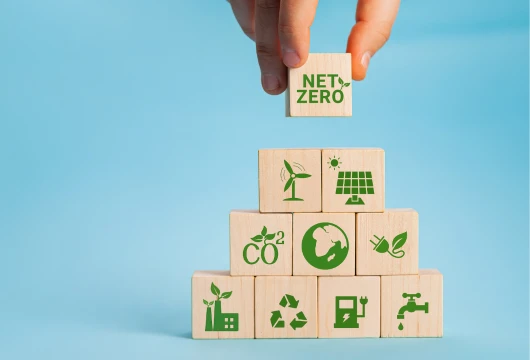SAP Launches Net-Zero Technology for Seamless Carbon Data Exchange
As businesses worldwide prepare for COP29, where industry leaders and policymakers will discuss pressing sustainability challenges, innovative solutions that accelerate net-zero goals are taking centre stage. In this context, SAP has announced the general availability of SAP Sustainability Data Exchange, a cutting-edge software-as-a-service (SaaS) solution that transforms how companies collect, share, and analyze carbon-related data across their supply chains. With its focus on scaling sustainability efforts, this tool provides businesses with the framework to collaborate more efficiently and achieve net-zero emissions.
The launch of this innovative platform addresses a key challenge for many companies: managing carbon emissions across the entire supply chain. While reducing direct emissions is relatively straightforward, tackling emissions from upstream and downstream operations—commonly called Scope 3 emissions—can be complex and data-intensive. SAP Sustainability Data Exchange is designed to solve this problem by providing a standardized approach to exchanging carbon data between partners, empowering organizations to shift from relying on estimates to using precise, real-time data.
Driving Net-Zero with Data Transparency
One of the primary obstacles businesses face when pursuing net-zero goals is the reliance on outdated spreadsheets or questionnaires, which do not offer a scalable or collaborative approach to managing carbon emissions. Additionally, the lack of standardized carbon footprint calculations has led to fragmented efforts, with many companies relying on industry averages rather than actual, verifiable data. SAP’s new platform changes the game by introducing a standardized data collection and sharing method that simplifies collaboration and eliminates the inconsistencies that have hindered previous sustainability initiatives.
SAP’s innovative Sustainability Data Exchange platform helps companies identify high-emission processes or products, avoid double-counting emissions, and optimize carbon footprints using actual supplier data. This empowers businesses to implement data-backed strategies to reduce emissions and make their supply chains more sustainable.
Embedded within the broader SAP ecosystem, the platform integrates seamlessly with SAP S/4HANA for controller data replication and SAP Sustainability Footprint Management to enable large-scale, accurate carbon footprint calculations. This integration ensures that sustainability data is not siloed but embedded into core business processes, providing companies with a holistic view of their environmental impact.
Innovative Net-Zero Technology Simplifies Supply Chain Carbon Management
Businesses must work together to make a real impact on carbon emissions. SAP has built the Sustainability Data Exchange platform focusing on interoperability and standardization, ensuring it complies with leading industry frameworks like the Partnership for Carbon Transparency (PACT) and the automotive sector’s Catena-X network.
PACT has developed global standards for calculating and exchanging Scope 3 emission data—emissions that occur along a company’s value chain but are outside its direct control. By aligning with these standards, SAP enables companies to collaborate more effectively without compromising data integrity. The Catena-X network, in particular, has certified SAP Sustainability Data Exchange for its sustainability use cases, making it easier for businesses in the automotive industry to adopt standardized carbon data exchange practices.
WITTE Automotive, a leading tier 1 automotive supplier, was one of the first to adopt SAP Sustainability Data Exchange. By integrating supplier footprints and calculating accurate carbon footprints for its parts and components, WITTE Automotive has been able to exchange emissions data with customers and suppliers in a standardized way. This seamless data sharing enhances transparency and trust, allowing businesses to make informed decisions that reduce their environmental impact.
Harnessing the Power of Net-Zero Technology
As companies move towards net-zero emissions, technology like SAP Sustainability Data Exchange plays a vital role in ensuring carbon management becomes an integral part of their operations. SAP’s Green Ledger, generally available by the end of 2024, complements this approach by enabling companies to treat carbon emissions with the same precision and accountability as financial data.
For many businesses, managing carbon emissions is not just a regulatory requirement but a financial imperative. Accurately measuring and managing carbon footprints across the supply chain can lead to significant cost savings and open up new opportunities in carbon markets. By embracing SAP’s net-zero technology, companies can incorporate carbon data into their financial decision-making processes, aligning sustainability efforts with business goals.
The Role of the SAP Business Network
A key component of SAP’s solution is its integration with the SAP Business Network, a global platform that handles over $6 trillion in annual commerce across 750 million transactions. By leveraging the power of this network, businesses can easily collaborate with partners across the globe to share carbon data and co-innovate on sustainability initiatives. This collaborative approach helps companies manage Scope 3 emissions more effectively, ensuring that every part of the value chain contributes to overall sustainability goals.
The global scale of the SAP Business Network provides companies access to a broad portfolio of solutions, from enabling product traceability to tracking and calculating Scope 3 emissions. This comprehensive ecosystem supports businesses at every stage of their sustainability journey, from data collection to reporting and compliance.
A New Era of Carbon Accountability
With sustainability now a critical business priority, SAP’s launch of the Sustainability Data Exchange marks a significant step towards enabling businesses to meet their net-zero goals. By providing a scalable, standardized, and transparent approach to carbon data exchange, SAP is helping companies make sustainability a core part of their operations.
Combining innovative technology, industry standards, and global collaboration creates a robust foundation for businesses to manage their environmental impact. As more companies adopt SAP’s net-zero technology, we will likely see a transformation in how industries approach carbon management, driving meaningful progress toward a greener future.
For more in-depth analysis and inspiring climate news, click here.

